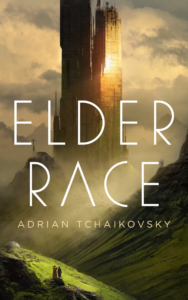
This review is based on an eARC (Advance Reader Copy) provided by the publisher via NetGalley in exchange for an honest review. Elder Race will be released on November 16, 2021.
I knew absolutely nothing about Elder Race when I saw it come available on NetGalley, but I liked Children of Time enough to give me some faith in Adrian Tchaikovsky, so I submitted an ARC request. My reward? One of my absolute favorite books of the year.
Elder Race tells one story that takes place in two subgenres with entirely different styles. We begin with a fantasy story—told in a moderately formal, mythic style—about a princess who has grown up hearing tales of the mysterious sorcerer at the top of the mountain. When a demon threatens an allied country and the regent seems content to let them deal with their own problems, she takes it upon herself to make the treacherous journey to enlist the sorcerer’s aid against a supernatural enemy. But the alternate chapters tell the story of an anthropologist second class, isolated and depressed on an alien planet, fearing his promised colleagues will never arrive, who against his better judgment decides to protect the low-tech locals from whatever archaic technology has been unearthed and turned against them. The sorcerer, of course, is the anthropologist, and his more casual, first-person chapters tell the same story as the Princess’, but from a radically different perspective.
If I were to imagine a book that hit all my favorite genre tropes, I’m not sure I could do as well as Elder Race. I enjoy stories that lean in to the maxim that “sufficiently advanced technology is indistinguishable from magic” and tell science fiction tales from a fantasy perspective. I also enjoy stories featuring difficult but well-intentioned cross-cultural communication, and this has both in spades. Throw in a lead struggling with clinical depression, and Elder Race was set up to be a home run of a read.
But to deliver on its promise, Tchaikovsky still needed to nail the execution. And reader, he surely did. The two styles each perfectly captured the feel of their respective subgenres, and the switches were smooth enough that I was halfway through the novella before I even noticed that the story was switching between first-person and third-person. The difficulty in communication was built slowly, climaxing in a short chapter written in a two-column format, with what one character perceives himself to say on the left and what the other character hears on the right. It’s an audacious structural choice, and it works perfectly (although it does require some flipping back and forth in the ebook for sentences that cross the short kindle page boundaries).
And while the cross-cultural communication is a major theme, it is far from the only one, with both lead characters vibrant enough to feel fully realized, even in a novella-length story. A lot of the characters’ inner lives play directly into the communication storyline—a princess wrestling the sorcerer’s price for aid, cultural taboos on emotional displays, and the conflation of psychological struggles with physical ones—but there’s plenty that stays purely internal. In particular, the anthropologist cycles between stuffing his emotions deep below the surface and suffering episodes of being entirely overwhelmed by hopelessness and isolation. It’s a pattern that’s sharpened by the sci-fi framing yet rings chillingly true to life.
You’ll note that I’ve doled out a lot of praise without saying much about the plot. And that isn’t because the plot is bad—it’s a well-constructed adventure that isn’t out to redefine either subgenre—but I don’t expect it to blow minds either. There’s enough there to support both the individual character arcs and the culture clash, and not everything goes entirely as expected, but it’s not a book that’s out to wow with twists and turns. If you’re here for the rest, the plot will serve. If you’re not here for the rest, the plot won’t change your mind.
I tend to be pretty sparing with scores over 18, and a 20 generally means it’s something with the quality to be genre-defining (not necessarily that it has defined a genre, just that it’s good enough to do so). And I’m not sure Elder Race is there—it’s a brilliant execution of a few tropes that I like a whole lot, along with some really strong character work—but I’m also not sure what more I could ask of a novella. Maybe I wasn’t totally convinced that an anthropologist would have such detailed knowledge of the tech he was using, but it wasn’t much of a stretch, and it didn’t really inhibit my enjoyment. And, while the translation difficulties seemed extreme at times, I suspect that’s because it was more realistic than the more familiar universal translators scattered throughout the genre.
At any rate, when it was all said and done, Elder Race gave us two compelling character arcs, tackling timeless problems in a way that was fascinating and never took the easy way out, and it did so in under 40,000 words. Whether that’s a 19 or a 20, it’s certainly hard to name a novella that’s better.
Recommended if you like: sci-fi disguised as fantasy, cultural clashes, exploration of mood disorders, adventure stories.
Can I use it for Bingo? I’m not sure it fits any hard mode apart from the personal squares (Comfort Read, New to You Author), but it’s a 2021 Publication with First Person Perspective and a Genre Mashup.
Overall rating: 20 of Tar Vol’s 20. Five stars on Goodreads.
